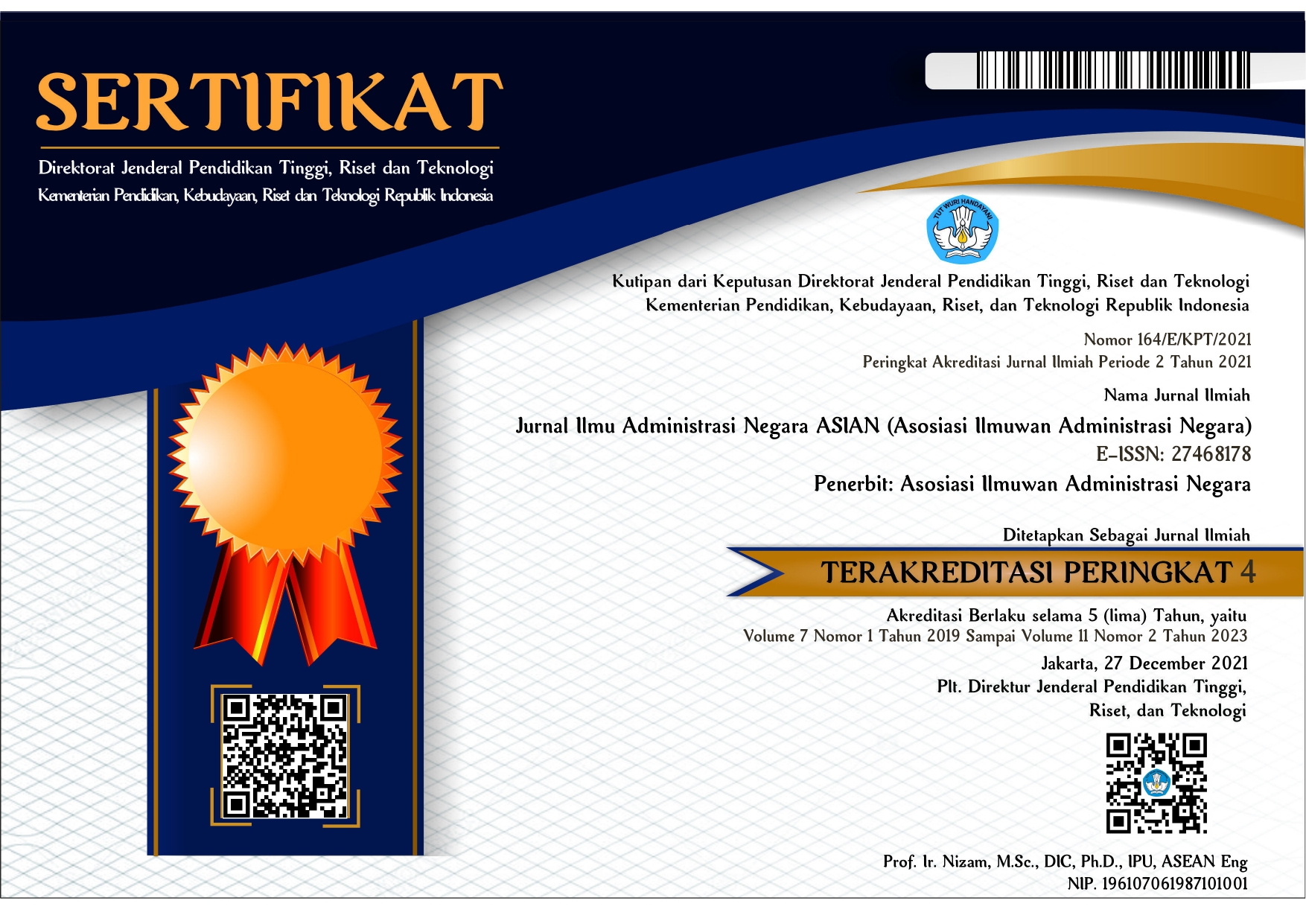Implementasi Program Kota Tanpa Kumuh (KOTAKU) Di Kelurahan Purbalingga Kidul Kecamatan Purbalingga Kabupaten Purbalingga
 Abstract views: 856
,
Abstract views: 856
,
 PDF downloads: 719
PDF downloads: 719
Abstract
Policy implementation is the implementation of a policy so that the objectives of the policy can be achieved. Implementation in terms of reducing slum area is one of the problems in Indonesia. The problem in this study was motivated by the lack of fulfillment of clean water needs, the people who participated less in the implementation of the KOTAKU program, and the absence of policies that supported the KOTAKU Program in the Purbalingga Kidul Village. This study aims to determine how much influence the idealized policy, target group, implementing organization and environmental factors have on the successful implementation of the No Slum City Program (KOTAKU) in the Purbalingga Kidul Village. The research method used was quantitative associative with a sample of 116 respondents and the sampling technique used the census method or total sampling. The analytical method used is Kendall Tau-c Correlation, Kendall W Concordance Coefficient and Ordinal Regression Analysis. The results of the study show that: (1) There is a positive and significant influence between the idealized policy on the success of the implementation and the regression coefficient of 0.608. (2) There is a positive and significant influence between the target group on the success of the implementation with a regression coefficient of 0.413. (3) There is a positive and significant influence between implementing organization on the success of implementation with a regression coefficient of 0.645. (4) There is a positive and significant influence between the environmental factors on the success of the implementation with a regression coefficient of 0.706. (5) There is a positive and significant influence between idealized policy, target group, implementing organization and environmental factors on the success of implementation with a regression coefficient of 0.824.
Downloads
References
Aji Ratna Kusuma, Santi Rande & Sahria Aprilliana. (2018). Partisipasi Masyarakat dalam Pelaksanaan Program Kota Tanpa Kumuh (Kotaku) (Studi Tentang Program Pembangunan Drainase dan Sanitasi di Kelurahan Teritip Kota Balikpapan). eJurnal Administrasi Negara, Volume
, Nomor 1: 7034-7048
Asna Aneta. (2010). Impelementasi Kebijakan Program Penanggulangan Kemiskinan Perkotaan (P2KP) di Kota Gorontalo. Jurnal Administrasi Publik, Volume 1, Nomor 1: 54-65
Dimas Alif Budi N., M. Saleh Soeaidy dan Minto Hadi. (2013). Implementasi Program Pemberdayaan Masyarakat Melalui Pelatihan Keterampilan Dasar (Studi di Kecamatan Tambaksari Kota Surabaya). Jurnal Administrasi Publik, Volume 1, Nomor 5:862-871
Ilham Arief Sirajuddin. 2014. Implementasi Kebijakan Pemerintah Daerah dalam Pelayanan Publik Dasar Bidang Sosial di Kota Makassar. Jurnal Administrasi Publik, Volume 4, Nomor 1:1-14
Indah Pratiwi Wibawati, Soesilo Zauhar dan Riyanto. (2014). Implementasi Kebijakan Promosi Kesehatan Masyarakat Dinoyo Kecamatan Lowokwaru Kota Malang. Jurnal Administrasi Publik, Volume 2, Nomor 11:1-5
Ombi Romli. (2017). Implementasi Program Beras Miskin (Raskin) di Desa Saketi Kecamatan Saketi Kabupaten Pandeglang. Jurnal Kajian Administrasi dan Pemerintah Daerah, Volume 10, Nomor 6:87-97
Sri Maryuni. (2015). Implementasi Program Nasional Pemberdayaan Masyarakat (PNPM) Mandiri Perkotaan di Kota Pontianak. Jurnal Spirit Publik, Volume 10, Nomor 1:19-30
Sri Yuliani dan Gusty Putri Dhini Rosyida. (2017). Kolaborasi Dalam Perencanaan Program Kota Tanpa Kumuh (Kotaku) di Kelurahan Semanggi Kota Surakarta. Jurnal Wacana Publik, Volume 1, Nomor 2:33-47
Sri Wahyuni, Onny Setiani, Suharyanto. (2012). Implementasi Kebijakan Pembangunan dan Penataan Sanitasi Lingkungan Berbasis Masyarakat di Kabupaten Tulungangung. Jurnal Ilmu Lingkungan, Volume 10, Issue 2:111-122
Sugiyono. 2011. Metode Penelitian Kuantitatif. Bandung: Alfabeta
Tauhid. (2017). Implementasi Kebijakan dan Revitalisasi Kota Tanpa Kumuh Neigborhood Upgrading and Shelter Sector Project (NUSSP) di Kota Bima. Jurnal Administrasi Negara, Volume 14, Nomor 3: 118-133
Winarno, Budi. 2002. Kebijakan dan Proses Kebijakan Publik. Yogyakarta: Media Pressindo
Radar Banyumas, 2016, Lima Kelurahan di Purbalingga masuk Kawasan Kumuh,[online], (http://radarbanyumas.co.id/lima-kelurahan-di-purbalingga-masuk-kawasan kumuh/, diakses tanggal 5 November 2018 pukul 11.00) Peraturan Menteri PUPR PUPR No. 02/PRT/M/2016
Putra, Fadillah. 2001. Paradigma Kritis Dalam Studi Kebijakan Publik. Yogyakarta: Penerbit Pustaka Pelajar
Copyright (c) 2020 Jurnal Ilmu Administrasi Negara ASIAN (Asosiasi Ilmuwan Administrasi Negara)

This work is licensed under a Creative Commons Attribution-ShareAlike 4.0 International License.
Authors who publish with this journal agree to the following terms:
1. Copyright on any article is retained by the author(s).
2. The author grants the journal, right of first publication with the work simultaneously licensed under a Creative Commons Attribution License that allows others to share the work with an acknowledgment of the work’s authorship and initial publication in this journal.
3. Authors are able to enter into separate, additional contractual arrangements for the non-exclusive distribution of the journal’s published version of the work (e.g., post it to an institutional repository or publish it in a book), with an acknowledgment of its initial publication in this journal.
4. Authors are permitted and encouraged to post their work online (e.g., in institutional repositories or on their website) prior to and during the submission process, as it can lead to productive exchanges, as well as earlier and greater citation of published work.
5. The article and any associated published material is distributed under the Creative Commons Attribution-ShareAlike 4.0 International License









